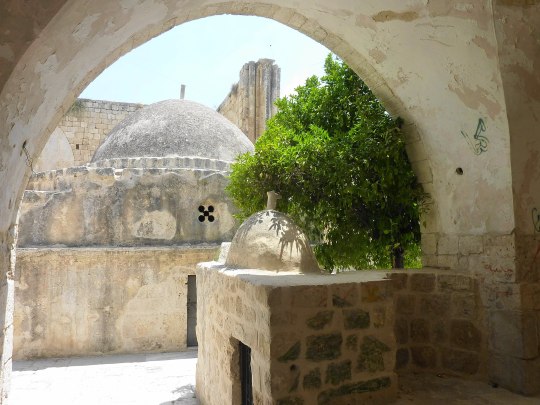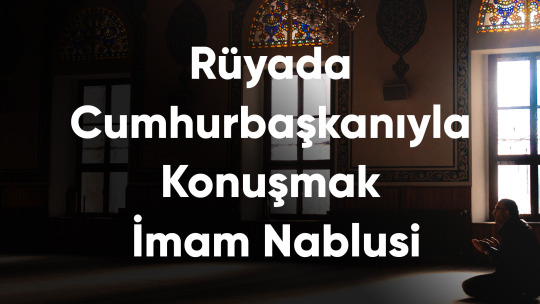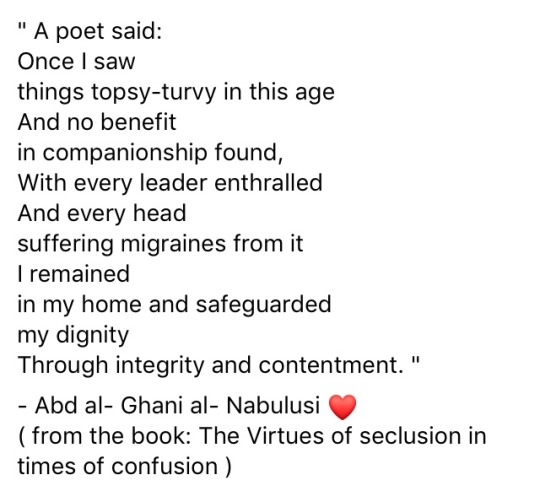#nablusi
Text






the nabi yahya (prophet john) mosque/maqām in sebastia, palestine. it stands on a site identified since byzantine times to be where john the baptist's body was buried by his followers. now the main mosque of sebatia, the current structure was originally a crusader church built on top of a byzantine tomb for john along with jewish prophets elisha and obadiah. it was modified into a mosque on the order of saladin after his defeat of the crusaders in the battle of hattin in 1187.
#palestine#architecture#interior#worship#muslim#old & new#my posts#sebastia is a village of/near nablus#& nablus is also very well-known for their desserts (and their kanafeh in particular)#and also their cheese (which is why there's a nablusi cheese) (and also probably where the being known for kanafeh comes from)#if you live in a city and see a dessert place advertised as ''nablusi'' GO THERE. your life will b changed
27 notes
·
View notes
Text
🚨 Palestinian Ministry of Health in Gaza:
—
The ground aid reaching the north of the Gaza Strip is very, very minimal. It is not enough for anyone.
This assistance comes from two main routes: firstly, Salah Al-Din Street, where there is a roundabout constructed by Kuwait, so it is named Kuwait Roundabout. The other location is the Sea Street at the Al-Nablusi Junction, named after a sweet shop opened by a freed prisoner from the West Bank in the Gaza Strip.
Hungry people gather at these two spots (Kuwait Roundabout and Nablusi Roundabout) hoping to get any food. Bombing of these gatherings of hungry people has become a daily routine practiced by the occupation and witnessed by the international community on their screens.
Hunger will ravage all the inhabitants of northern Gaza. The aid is too little. The cost of a meal could mean certain death.
Help the people of the north; do not leave them prey to hunger, bombing, and disease.
Doctors will die. The nurses there will die. And the world will witness the largest number of victims of hunger in the coming days if you do not act today to save us. We will all die.
#palestine#free palestine#gaza#free gaza#israel#jerusalem#tel aviv#gaza strip#joe biden#benjamin netanyahu#oscars#north gaza#gaza genocide#palestinian genocide#gaza update#gaza news#oscars 2024#academy awards#eurovision 2024#eurovision song contest#esc 2024#ramadan
82 notes
·
View notes
Text


"Allah Sübhânû ve Teâlâ kendisini tanıyabilmemiz için bize düşünme yetisi bahşetti. Eğer Allah'ı tanırsak ona iaat eder, güvende olur, dünyada ve ahirette saadete kavuşuruz. Problem şu ki insan, zekâsını sadece para kazanma yolunda, bulunduğu yerde yahut başka bir mekânda sabit kalmak veya en az uğraş ile dünyadaki en fazla şöhreti elde etmek için kullanıyor. Ancak insan, zekâsını ve düşünme yetisini yaratılış amacının dışında kullandığında k��yamet günü en büyük pişmanlığı yaşar. Elindeki bir milyon lira değerinde bir çeki işlem yapmak için kullandığın sıradan bir kâğıt gibi harcayıp atmak akıllıca olur mu? Sonrasında da bu çekin sana ve ailene ömrünün sonuna kadar yetecek bir değer taşıdığını öğrensen nasıl olur? İşte insan da aklını yaratılış amacının dışında kullandığı takdirde bu pişmanlığı yaşayacaktır."
|Râtib en-Nablusi - Neden Dünyadayız?
101 notes
·
View notes
Note
Place in Africa you wanna go the most?
Favourite cheese?
You can only eat one meal for the rest of your life, what is it?
Tanzania, to see the Rift Valley (because anthro nerd - this predates my BSG obsession). Would also love to go to Kenya. And if Somalia is ever stable enough for serious archaeological work, I would seriously consider switching careers and going back to [different] grad school to dig there. Because I would bet good money that there will be major finds on par with the stuff the Leakeys found. And I'd love to climb Kilimanjaro at some point. And Rwanda, because gorillas. And do I actually need to pick only one place?
I have to pick only one cheese? This is really, really hard and kind of unfair. Can I pick my top 3 instead?
Really good, sharp cheddar with little salt crystals
Nablusi
A nice, pungent bleu cheese like Cambozola
Bonus cheese: Good feta - not the shit they sprinkle on salads, but the creamy, sour kind that one buys in blocks from the Middle Eastern Deli.
One meal? Okay... Um, hear me out on this. Tabouli, but with chickpeas and lentils thrown in, because it'll still have some flavor *and* I probably won't die of any major nutritional deficiencies. Is it my favorite meal? No. But I like it well enough and enjoy not having scurvy.
2 notes
·
View notes
Text
Ibrahim Nablusi: The Lion of Nablus - Mehr News Agency
18 (MNA) – Ibrahim Nablusi is the symbol of a new armed resistance led by ... of Nablus only saw the brutality and massacres that comes with the ...
0 notes
Text
Rüyada Cumhurbaşkanıyla Konuşmak İmam Nablusi
Rüyada Cumhurbaşkanıyla Konuşmak İmam Nablusi
Rüyada cumhurbaşkanıyla konuşmak imam nablusi olarak pek çok kişi tarafından araştırılıyor. İnsanlar rüyalarında cumhurbaşkanını gördükleri zaman bunun ne anlama geldiğini merak ediyorlar.
Rüyada cumhurbaşkanıyla konuşmak imam nablusi yorumu incelendiği zaman insanların yakın çevrelerinde hayırlı insanlarla yer alacakları anlamına geliyor. Aynı zamanda da sıkıntı ve dertlerinin geri planda…

View On WordPress
0 notes
Text
Rüyada İskele Görmek
Çağdaş Ulema Tarafından Yapılan Rüya Tabiri:Rüyada İskele Görmek; İskele görmek; uzun bir sürede gerçekleşeceğini sandığınız bir arzunuzun kısa sürede gerçekleşeceğine işarettir. Çağdaş Ulema İmam Nablusi Tarafından Yapılan Rüya Tabiri: Rüyasında iskele gören kimsenin işleri düzene iyi olacak demektir. İskelenin yıkıldığını görmek işlerinizin bozulacağına ve sıkıntıya düşeceğinize işaret eder. İmam Nablusi Molla Cami Tarafından Yapılan Rüya Tabiri: Rüyada iskeleyi sağlam ve geniş bir şekilde görmek, işlerin yolunda olmasına, dar, bozuk ve çürük bir iskele görmek ise işlerin bozulmasına ve zorluğa işaret eder. Bazen de iskele görmek deniz yolculuğuna çıkmaya işaret eder.Molla CamiDiyanet Tarafından Yapılan Rüya Tabiri: Rüyanızda kendinizi herhangi bir vapur iskelesinde yürüyor olduğunuzu veya vapura bindiğinizi görmeniz; çalışacağınız herhangi bir işte başarı elde edeceğinize yorumlanır.
DiyanetSeyyid Süleyman Tarafından Yapılan Rüya Tabiri: Rüyada sağlam geniş ve mükemmel bir iskele görmek; halkın işlerinin muntazam olmasıyla yorumlanır. Çürük, dar ve bozuk iskele görmek; halkın işlerindeki intizamsızlığa ve zorluğa işaret eder. Kendisini bir iskelenin üzerinde gören, halkın işleriyle alakalı bir mevkie geçer. İskele tamir ettiğini yahut inşa ettiğini gören, Allah'ın kullarına hizmet eder. Onlara yardımcı olur. İskeleyi yıkmak; halkın işlerini zorlaştırmaktır.Seyyid Süleyman
Read the full article
#ÇağdaşUlemaRüyaTabirleri#DiyanetRüyaTabirleri#İmamNablusiRüyaTabirleri#İskeleGörmekRüyaTabiri#İskeleGörmekRüyaYorumu#MollaCamiRüyaTabirleri#RüyadaİskeleGörmekÇağdaşUlema#RüyadaİskeleGörmekDiyanet#RüyadaİskeleGörmekİmamNablusi#RüyadaİskeleGörmekMollaCami#RüyadaİskeleGörmekSeyyidSüleyman#RüyadaİskeleRüyaTabiri#RüyadaİskeleRüyaYorumu#RüyamdaİskeleGördüm#RüyamdaİskeleGördümRüyaTabiri#RüyamdaİskeleGördümRüyaYorumu#SeyyidSüleymanRüyaTabirleri
0 notes
Text
Ya Allah, izinkan aku bertemu dengan-Mu sebagai seorang syuhada.
Please accept Ibrahim Al Nablusi (rahimahullah)
1 note
·
View note
Text
"Allah'ım! Senin sevgini benim gönlümde sevgilerin en başı haline getir. Bir de sadece Senden korkayım ve Sana karşı haşyet duyayım. Sana kavuşmaya karşı içimi şevkle doldur.
Mevlânâ Abdülgani en-Nablusi (k.s)

36 notes
·
View notes
Text
Kecerdasan yang Membunuh
@edgarhamas
Selamat datang di zaman yang menuhankan kecerdasan. Walaupun secara tersurat kita tak benar-benar mengatakannya, nyatanya dunia ini begitu memuja gelar; dibeli dan diburu. Kalau demi ilmu yang dipakai untuk berkhidmat maka ia mulia, tapi kalau untuk berkhidmat pada egonya, itu yang jadi problema.
Cerdas itu anugerah. Ia bisa memudahkan yang susah, menguraikan yang rumit, dan membantu yang sulit. Tapi jadi bencana kalau cerdas untuk membohongi, memperalat dan memperdaya. Itulah mengapa banyak Ulama bilang, bahwa kecerdasan bisa masuk dalam kategori "fitnah" yang menyesatkan manusia.
Fitnah? Ya. Jika penggunanya bertambah ilmu, tapi dengan ilmunya ia bermain-main dengan aturan-Nya. Fenomenanya seperti ini; orang yang beriman utuh dengan akal dan hatinya bernarasi Sami'na wa atha'na; "kami mendengar dan kami taat", tapi orang yang cerdasnya untuk membangkang akan bernarasi, sami'na wa nazharna; "kami mendengar tapi kami timbang-timbang dulu."
Barangkali inilah salah satu jawaban dari tanda tanya besar saya yang seringkali berpikir, mengapa Rasulullah berdoa dengan lugasnya,
"Ya Allah, aku berlindung pada-Mu dari ilmu yang tidak bermanfaat, dari hati yang tidak khusyu dan dari doa yang tidak dikabulkan."
Karena ilmu itu ada yang menghidupkan dan ada yang membunuh. Dalam salah satu dars-nya, Syaikh Ratib An Nablusy berkata, "tanda ilmu bermanfaat adalah ilmu yang mendekatkan pada Allah, dan tanda ilmu yang membahayakan adalah yang membuat pemiliknya mencari celah untuk menghindari aturan Allah."
Ada juga sebuah ungkapan Ulama —ada yang menisbatkannya pada Rasulullah walaupun tidak kuat— bahwa "siapa yang bertambah ilmunya, tapi tak bertambah dekat dengan Allah, maka sebenarnya tidak bertambah kecuali bertambah jauh (dari Allah)"
Itulah mengapa, dalam literatur Islam, seorang 'Alim' bukanlah tentang orang yang banyak tahu saja. Orang digelari sebagai 'Alim' jika ia mengilmui kebenaran dan dia mengamalkannya. Adapun jika banyak tahunya, ia hanya masih sebatas 'naqil' atau sang pelaku copy paste saja.
Fitnah orang berilmu juga besar. Al Qur'an menyimbolkannya dengan sosok Haman, arsitek Fir'aun yang berjanji mempersembahkan pada rajanya sebuah menara tinggi untuk bisa menengok Tuhannya Musa. Dengan ilmunya, ia mampu membuat bangunan yang tak tertandingi secara teknologi kala itu, tapi tujuannya membuat murka langit.
Pernah melihat yang seperti itu di zaman ini? Ya. Saya pun nggak kaget lagi. Sejarah selalu mengulang dirinya sendiri. Fenomenanya sama, walau pelakunya berbeda. Itulah mengapa kita perlu jadikan Al Qur'an sebagai imam kita, logika sebagai makmumnya. Jangan dibalik, nanti jadinya seperti orang keblinger yang menghalalkan hubungan di luar nikah.
#catatan#renungan#kontemplasi#islamicquotes#hijrahquote#ntms#30haribercerita#resolusi#motivasionline#hijrah#sahabathijrah
1K notes
·
View notes
Text
2 Dakika okuma ...
3 dk düşünmeye davet...
Suriyeli Prof Dr. Muhammed Ratib Nablusi Hoca'dan:
En şiddetli hastalıklardan biri SİNSİ hastalıktır.
Belirtileri görülen yahut hissedilen türden değildir. Yakalandığınızda çok ciddi zarar verir...
Bu hastalığın adı “nimete alışma hastalığı” dır.
Dört şekilde kendini gösterir.
1- Allah'ın nimetlerine alışmak. Adeta nimet
değilmiş gibi görmeye başlamak.
Nimetin nimet olduğunu hissetmeyip müktesep hak gibi görmek.
2- Evine giren kişinin ailesini sağ salim görmeye alışması. Onları iyi halde görüp bunun için Allah'a hamdu sena etmemek.
3- Alışverişe gidip market arabasına dilediğini koyup ücretini ödeyerek evine dönerken nimeti vereni ve ona şükretmenin gerektiğini zerre miktar hissetmemek. Bunu gayet normal bir durum olarak görüp adeta en tabii hakkı gibi telakki etmek.
4- Her sabah güven içinde uyanıp sağlığı yerinde bir şikayeti ağrısı sızısı olmadan kalktığında Allah'a hamd etmemek.
Dikkat!
Sen bu durumlardan birisini yaşıyorsan tehlike altındasın.
Evine girdiğinde…
Allah sana anne baba yahut eş çoluk çocuk nimeti vermişse,
Sağlıklı ve iyi bir durumda isen Allah tealaya bol bol hamdet, şükret...
Hayatının nimetlere alışmanı sağlanmasına izin verme.
Sen hayatını bu yüceler yücesi İlaha hamd ve şükre alıştır...
Nasılsın diye sorduklarında "Aynı be ne olsun" deme!...
Sen sayamayacağın nimetler içindesin
Allah teala sana onları yeniliyor. Güncelliyor...
Hem de hergün.
Sana hamd ve Şükrü de farz kılmış.
Niceleri o güne senin sahip olduğun nimetlerinden mahrum başlamıştır.
Nicesi güven içindeyken o gün korkarak kalkmıştır.
Nice çalışan o gün işsiz kalmıştır.
Nice zengin o gün fakir düşmüştür.
Nice gözü gören o gün kör olmuştur...
Nice sağlıklı insan o gün sağlığını kaybetmiştir.
Sana ise nimetler yenilenmiştir.
O zaman de ki:
Allah'a hamd olsun...
7 notes
·
View notes
Photo

rüya ve fener
on rüya, on yedi fener öyküsü.
uçar: ‘’yol göstericim’’ dediği: italo calvino ve giorgio manganelli.. ikisinin de kısa metinleriden oluşan kitaplarında başardıklarını gördüğü en önemli şeyin: ‘’iç tutarlılık ve bütünselliğe ulaşarak çok güçlü bir atmosfer yaratması.’’ olduğunu söylüyor.
‘’farklı rüya öykülerinin aslında tek bir dili, rüyaların dilini konuştuğunu ve böylece okuru kişi ve objelerin hafifleyip salındığı, tekinsiz, loş ve her şeyin mümkün olduğu bir komşu aleme götüreceğini umuyorum.’’
‘‘insanın başkasıyla paylaşamayacağı bir şeydir rüya.. insanlar rüyada yalnızdır. uyandıklarında da rüyalarıyla baş başa kalırlar. kimseyle onu paylaşamazlar. fener yapılarının ve bekçilerin yalnızlığından bahsetmiyorum, bu ayan beyan ortada.’‘
‘‘iç içe açılan rüyalar.’‘
birinci kısım: uykuda (rüyalar)
‘‘kural olarak bir rüyayı yabancı bir dile çevirmek olanaksızdır ve bu sanırım elinizdeki gibi bir kitap için de aynı derecede geçerlidir. sigmund freud, rüyaların yorumu
‘’anlatıcı başlamadan önce uyardı:
katmerlidir dinleyecekleriniz. bir gülü oluşturan yaprakları düşünün. sırrı öğrenmek için yaprakları bir bir koparan aptaldır. gülün göbeğinde saklı bir şey yok.. rüya kendi başına bir mucize, uyku onu saklayan yaprak sırasıdır.’’
‘‘ tüm bunlar bir rüya, evet, dedi. ancak diğerleri de bir rüya. ben senin rüyanda bir bilgeyim, sen de benim rüyamda bir savaşçı. birbirimizi eğitiyoruz.’‘
‘‘ levh-i mahfuz, üzerinde yaşanmış, yaşanacak ve yaşamakta olan her şeyin işli olduğu; yüzüne tüm olayların ve tüm kişilerin yansıdığı bir aynadır.’‘
‘‘rüya, uçucu bir kuşun ayağı üzerindedir. tabir olunmadıkça onun için istikrar ve karar yoktur.’‘ imam nablusi, ta’tirül-enam fi tabiril menan
‘‘rüya ağzı izler. ona anlatan şekil verir. yorumlayanı sorarsanız, onlar da ağzı izler, rüyayı anlatanın dilinden konuşur, başka dil bilmezler. rüyayı sorarsanız, gerçekleşmekten başka şansı kalmaz.’‘
‘‘tasarlayabileceğimiz hiçbir şey yoktur ki rüyasa göremeyeceğimiz kadar saçma, karışık ya da anormal olsun.’‘ cicero, divinatione, book ıı’‘
ikinci kısım: uyanık (fenerler)
‘’kuleden gördüklerin gözlerine aittir; bedeninse kuleye.’’
‘‘..yedinci katta feneri çalıştıran mekanizma, sekizinci katta ise fener vardır. balkona yedinci kattan çıkılır.’‘
‘‘uçsuzun bucaksızın hakimi fenerci. kısıldığın yer evrenindir.’‘
‘‘özgürlüğün ve esaretin sınırı birdir.’‘
‘‘ufukları aydınlatan ışık dibini unutur mu hep?’‘
‘‘dışarıdaki felaketten mi dem vuruyorsun? asıl cehennem kulenin içindedir.’‘
‘‘ışık yoksa kule de yoktur.’‘
‘‘zavallı fener...’‘
‘‘raslantılarını kendine benzetir deniz..’‘
4 notes
·
View notes
Text
TAFAKKUR: Part 338
INTERPRETING DREAMS: Part 2
DREAMS: A SPIRITUAL APPROACH
Ahl Allah (people who have proximity to God) said that: "The spirit has two windows for the world of Barzah: sleep and inspiration. In dreams, sometimes a person sees future happenings directly and sometimes in symbols. The latter should be decoded. If the sensory organs are closed to the physical world, and the internal mirror (the heart) is clean of all evil and polished, spiritual beings and unknown writings in theLawh-i Mahfooz can be reflected and seen in this mirror. But if the senses are occupied with the material world and the internal mirror is rusty, the spirit cannot view the world of Barzah. Rather, it becomes busy with images left in the memory from the five senses. When a person dies, however, the spirit can view the metaphysical world and learn about the world of the Unseen (ghayb), for the senses and the body can no longer serve as obstacles. By inspiration, people can learn many previously unknown things. But if their hearts are not clean, they will not recognize and understand the actual source of these inspirations".
Ibn Khaldun devotes a portion of his book al-Muqaddimah (Prolegomena) to dreams:
"A dream is a spiritual activity that consists of seeing and observing the forms and shapes of entities reflected to the spirit from the Unseen (ghayb) after the spirit enters into the metaphysical world during sleep. When people are awake, they do not contemplate their spirituality, for they are occupied with their carnal and physical functions. Thus they forget the information reflected from the Unseen. Since people reduce their connection with the flesh and physical existence while asleep, they become spiritual entities somewhat like other spiritual beings and, when they turn toward the world of the Unseen, can observe angels and other ethereal beings [lateef entities(6)]"
The bond between body and spirit, merely a connection, becomes ideal during dreams. With this development, the human spirit becomes an incorporeal being and can perceive without the help of the body and the sense organs. In this state, the human spirit is lower than an angel, because an angel's perfection comes from its nature and creation. As an angel's intuition or cognition never develops, it cannot improve itself. However, as long as the spirit inhabits a physical body, it can develop and grow in metaphysical understanding. This ability can be classified into two groups: special (belonging to the saints in the form of gifts) and general (found in everybody in the form of contacting the Unseen).
The spirits of Prophets are purely spiritual, for they transcend the body. This state is the highest rank of spirituality. Its onset could be observed whenever a Prophet received Revelation, for his
body's perceptive faculties would enter a dozing-like period different from regular sleep. In reality, sleeping is greatly inferior to such a state. Concerning this state, the Prophet said: "The (good) dreams of a believer are one part of the forty-six parts of Prophethood (Al-Bukhari, vol. 9: no. 116). Some Muslim scholars interpret this hadith as meaning that when the Revelation began, it was in the form of dreams for the first 6 months. (His Prophethood lasted for 23 years in total, and so the first 6 months would constitute l/46th of this period.)
A Prophet's dreams are not ordinary, for they come true exactly as they are seen. All Prophets had dreams in the first stage of their Prophethood. This only indicates the association of dreams to Prophethood, not the reality of dreaming to the essence of Prophethood, of which dreaming constitutes only a small part. In addition, it is an innate human ability that allows us to reach spiritual and unseen worlds. The smallness of this fraction (l/46th) contrasts the relationship of this common ability to dream with a Prophet's ability to contact spiritual and unseen worlds.
Contacting these nonmaterial worlds is very difficult, although it is a general potential for human beings. Many obstacles prevent us from making the best use of this ability. The first one is the external senses. God made sleeping an innate and natural characteristic and state of mind so that we could bypass, temporarily, these external obstacles. During sleep, one can try to understand the reality behind events and also have some of his or her concerns addressed in dreams. For this reason, Prophet Muhammad regarded dreaming as a harbinger. He said: "Nothing is left of Prophethood except al-mubashshirat (harbingers, glad tidings)." His Companions asked: "What are al-mubashshirat?" He replied: "The true, good dreams (that convey glad tidings). Only pious people and you have such dreams" (Al-Bukhari, vol. 9: no. 119).
The nafs-i natika can perceive and think only via the human spirit, for they are tied to each other. Creation, through combining and synthesizing physical elements, prevents ethereal entities from influencing material objects. Since the human spirit is both ethereal (lateef) and located within material entities, it needs a means (the nafs-i natika) through which it can receive the stimuli of material things. The nafs-i natika, which fulfills this function, acts within the human spirit and has both internal and external perceptive abilities. Internal perceptions come through the brain's faculties, while external perceptions come through the five senses.
These means of perception, despite their innate abilities, inhibit the perception of metaphysical realities. The external senses, which are all corporeal, are used by the nafs-i natika so often that they become exhausted and require sleep to rest.
Even though the spirit can leave the body, tired senses inhibit the nafs-i natika from perceiving metaphysical realities. God implanted within the spirit a desire to depart from the material realm, as shown by its turning from the external senses toward the internal senses. As the night's coolness helps this departure, the body's natural heat withdraws deep inside the body and the spirit, which causes the nafs-i natika to ascend to the spiritual realm. The human spirit remains inside the body. This is why people fall asleep.
When the human spirit leaves the external senses and supervises the internal faculties, the nafs-i natika's tasks are alleviated. This reduces the obstacles to its ascent, which allows it to deal with sensory images. Imagination engenders virtual figures by synthesizing and analyzing sensory images, because the carnal soul perceives, observes, and becomes mostly accustomed and familiar with these figures. This is the basic habit of the nafs-i natika. After this, the collective sensory powers, which gather all external sensory perceptions in the brain, observe those images as if they were actually perceived with external senses.
During sleep, the spirit does not deal with internal or external powers. Rather, it grasps its spirituality as if it were a physical perception, and acquires information about the Unseen. The human spirit then submits these images directly to the imagination, which either accepts them totally or puts them into resembling shapes (symbols). Dreams that result from the latter process require interpretation, for the meaning is not immediately clear. If the nafs-i natika analyzes and synthesizes the images acquired through external senses and hidden in its memory with what it perceived from the Unseen during sleep, the dream is confusing and mixed up.
In an authentic hadith, the Prophet says: "There are three kinds of dreams: those inspired by God during sleep, those from angels, and those inspired by Satan" (Al-Bukhari, vol. 9: no. 144). This does not invalidate the above argument. Dreams that need to be interpreted are from angels, while confusing and mixed dreams come from Satan. The latter are beguiling and erroneous.
Most of our dreams are neither deliberate nor intentional. When one's spirit focuses on the Unseen world to learn the hidden reality about itself or something else, the reality of these things may reflect on it instantly, and the subjects of concern may become clear. If this is not the case, the spirit cannot see and observe whatever and whenever it wants to during sleep.
Medieval Islamic literature records many instances of pre-Islamic Arabs relying on soothsayers who also dealt with dream interpretation. For example, Shiqq (from the family of Enmer bin Nizar) and Sutayuh (a descendent of Mazun bin Garsan) were well-known soothsayers. Sutayuh had no bones in his body, except for his skull, and so could be folded like cloth.
The most well-known stories about these soothsayers are Shiqq's interpretation of Rebia bin Muzar's dream heralding the Abyssinian invasion of Yemen, and Sutayuh's interpretation of the famous Persian scholar Mubezan's dream. Chosroes of Persia sent 'Abdulmesih to ask Sutayuh to interpret Mubezan's dream. Sutayuh said that it foretold the coming of a new Prophet and the destruction of Chosreos' kingdom.
'Abdulgani an-Nablusi states, in light of Qur'anic verses and the Prophet's hadiths: They shall have glad tidings in this world and in the Hereafter (10:64). According to some Qur'an interpreters, glad tidings in the earthly life means dreams about a person regardless of who dreams; glad tidings in the Hereafter means seeing God.
The Prophet said: "One who does not believe in true dreams does not have a sound belief in God and the Resurrection." 'A'isha, the Prophet's wife, stated that: "The commencement (of the Divine Inspiration) to God's Apostle was in the form of true dreams in his sleep, for all of his dreams turned out to be true and clear as bright daylight" (Al-Bukhari, vol. 6: no. 478)
The Prophet once told Abu Bakr as-Siddiq: "I dreamed we were climbing up some stairs, but that I was two steps ahead (of you)." Abu Bakr interpreted this as follows: "O Messenger of God, after God raises your soul to heavens near Him and grants you His Compassion, I will give for another 2 1/2 years".
Your Lord will approve you (Yusuf) (as in your dream) select you and grant you the knowledge on interpretation of dreams (12:6), and 0 my Lord. You have indeed bestowed on me (something of) sovereignty, and taught me something of the interpretation of dreams and events... (12:101). According to these verses, God granted the knowledge of dreams to Yusuf (Joseph).
#allah#god#prophet#Muhammad#quran#ayah#islam#muslim#muslimah#revert#convert#hijab#help#sunnah#hadith#dua#salah#pray#prayer#welcome to islam#how to convert to Islam#new muslim#new convert#new revert#revert help#convert help#islam help#muslim help#reminder#religion
1 note
·
View note
Note
“The default assumption is that listening to music is permissible” every major scholar says that it is haram. Not a sin, but haram. The only exceptions are islamic music and even that is on thin ice. Please do research before recommending people haram. I deleted all the music (and I had over 3k songs) on my phone when Allah gave me guidance.
But yeah music, movies, and tv shows are haram. It’s not easy to let go of all of them unless Allah makes it easy for us so I’m not judging anyone, but you need to understand that they are haram. Try looking up what scholars say about these topics instead of forming personal opinions as that may be a form of innovation (bida, I think that’s what it’s called). May Allah forgive us.
The evidence against music is extremely flimsy, as I discuss in my article on music , and I’m afraid “every major scholar” forbidding music is rather inaccurate. From my article:
Many Islamic scholars reject the idea that music is prohibited. The scholar Ibn Hazm (d. 1064 CE, creator of the “fifth” school of Islamic jurisprudence) considers every hadith that has been used to make music haram fabricated, and considers listening to music the same as taking joy from a nature walk.
The scholar al-Shashi (d. 976 CE) says that Imam Malik permitted music. Imam al-Shafi`i says that there is no clear evidence to prohibit music.
The scholar al-Mawardi (d. 1058 CE) says that Abu Hanifah, Imam Malik and al-Shafi`i did not prohibit music.
The respected theologians Abu Hamid al-Ghazali, Ibn Daqeeq, Izz al-Din ibn Abd al-Salam (famous Shafi`ite scholar, known as the Sultan of Scholars in his time, d. 1262 CE), Abdul Ghani al-Nablusi, Ibn Qutaybah, al-Maqdisi, al-Dhahabi, Abu Talib al-Makki, Ibn al-Arabi al-Maliki and Imam al-Shawkani consider music permissible.
Among modern scholars who reject the prohibition on music are the Azhar scholars Muhammad al-Ghazali and Yusuf al-Qaradhawi, Hasan al-Attar, Mahmud Shaltoot, Ali al-Tantawi and Muhammad Rashid Ridha.
27 notes
·
View notes
